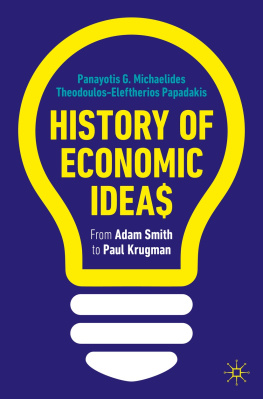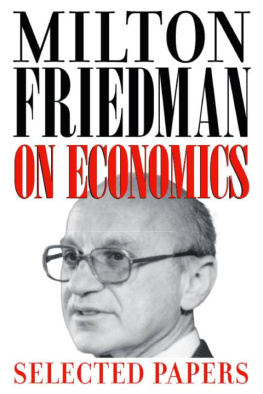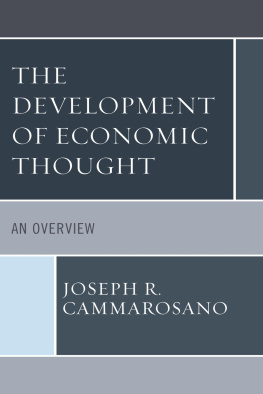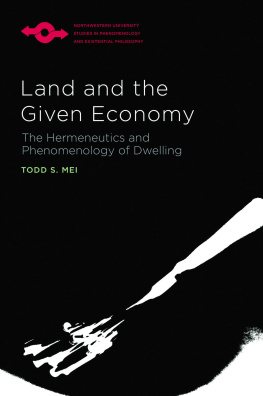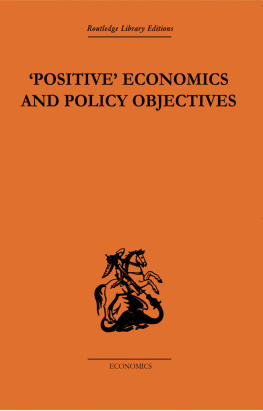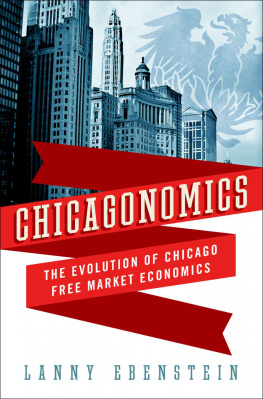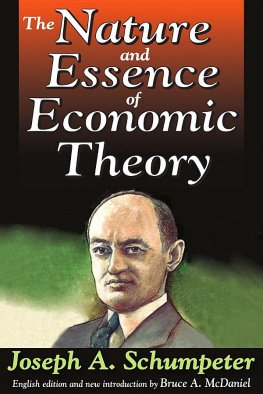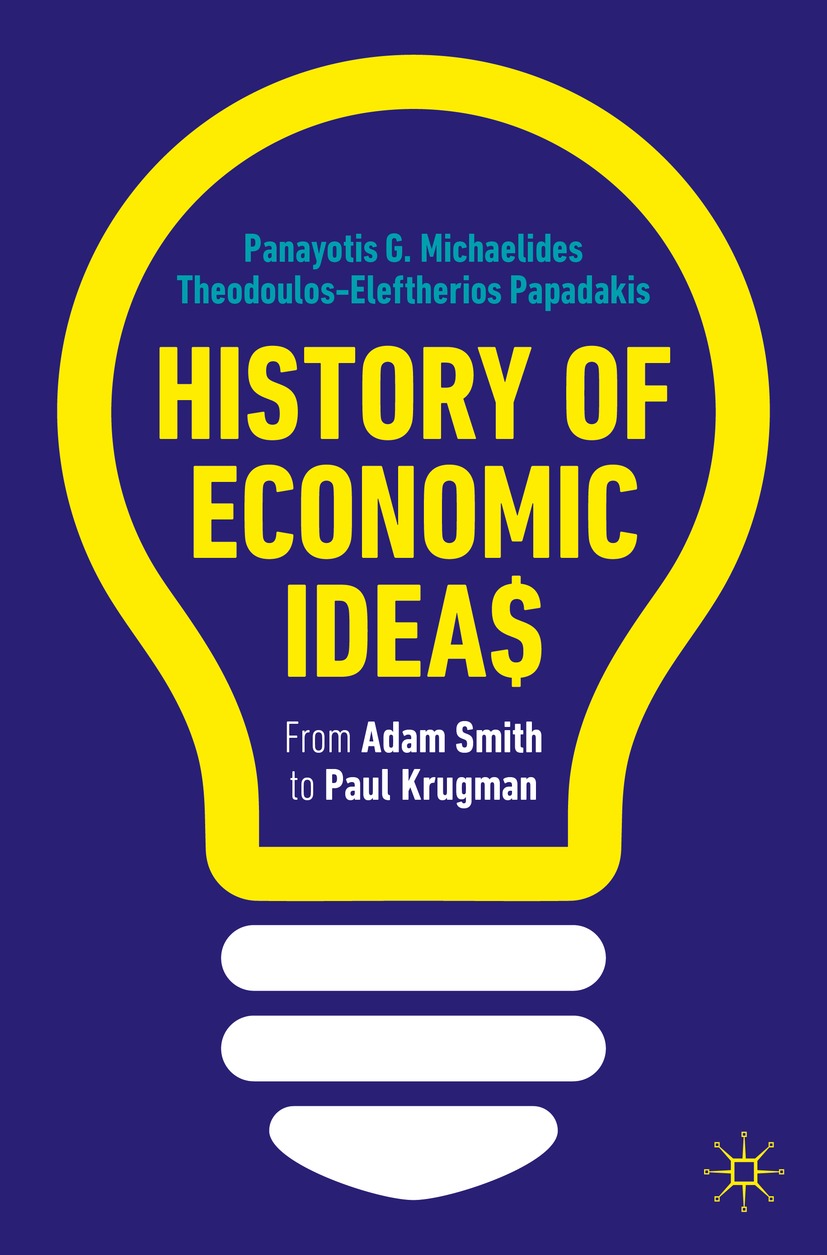Panayotis G. Michaelides and Theodoulos Eleftherios Papadakis
History of Economic Ideas
From Adam Smith to Paul Krugman

The Palgrave Macmillan logo.
Panayotis G. Michaelides
National Technical University of Athens, Athens, Greece
Theodoulos Eleftherios Papadakis
National Technical University of Athens, Athens, Greece
ISBN 978-3-031-19696-6 e-ISBN 978-3-031-19697-3
https://doi.org/10.1007/978-3-031-19697-3
Translation from the Greek language edition: : Adam Smith John Nash by Panayotis G. Michaelides and Theodoulos Eleftherios Papadakis, Panayotis G. Michaelides and Theodoulos-Eleftherios Papadakis 2021. Published by Tziola. All Rights Reserved.
The translation was done with the help of artificial intelligence (machine translation by the service DeepL.com). A subsequent human revision was done primarily in terms of content.
The Editor(s) (if applicable) and The Author(s), under exclusive license to Springer Nature Switzerland AG 2023
This work is subject to copyright. All rights are solely and exclusively licensed by the Publisher, whether the whole or part of the material is concerned, specifically the rights of reprinting, reuse of illustrations, recitation, broadcasting, reproduction on microfilms or in any other physical way, and transmission or information storage and retrieval, electronic adaptation, computer software, or by similar or dissimilar methodology now known or hereafter developed.
The use of general descriptive names, registered names, trademarks, service marks, etc. in this publication does not imply, even in the absence of a specific statement, that such names are exempt from the relevant protective laws and regulations and therefore free for general use.
The publisher, the authors, and the editors are safe to assume that the advice and information in this book are believed to be true and accurate at the date of publication. Neither the publisher nor the authors or the editors give a warranty, expressed or implied, with respect to the material contained herein or for any errors or omissions that may have been made. The publisher remains neutral with regard to jurisdictional claims in published maps and institutional affiliations.
This Palgrave Macmillan imprint is published by the registered company Springer Nature Switzerland AG
The registered company address is: Gewerbestrasse 11, 6330 Cham, Switzerland
To our students
teachers
friends
families
Preface
This book is addressed to those who wish to familiarise themselves with basic concepts of Economic Science or, simply, Economics and in particular with the way these concepts were developed by the great thinkers of the past. In other words, it serves as a History of Economic Thought of the last 250 years approximately, beginning with Adam Smith and ending with Paul Krugman.
The different chapters are linked conceptually and in historical order, but can also be read independently. The book presents key points from the work of each economist, together with some brief biographical information, and an attempt has been made to place them in the broader social and historical context of their time.
In addition, the book does not assume prior knowledge and is written in a concise but scholarly way, which should be easily accesible to all, experts as well as non-academic readers. Additionally, it contains some features such as the learning objectives, summaries, key takeaways and some revision questions that cover a very wide range of topics in contemporary History of Economic Thought.
Since the book is of an introductory nature, a great deal of effort has been made to keep it as simple and comprehensible as possible, and very little specialised knowledge is required. In order for the text to be readable and not to interrupt the flow of the text, the bibliographical references are listed, in the form of footnotes, at the end of the book.
We believe that a presentation of the main Schools of Economic Thought is appropriate for our project and for this reason we have sought to critically analyse the important economists who have dominated Economics to date and who are either the main representatives or are important exponents of one of the important Schools of Economic Thought. Furthermore, the book gives special emphasis on a critical evaluation of the theoretical controversies between the different Schools of Economic Thought as regards the character and role that the state can play in the economic life of societies.
In no way should the economists included in the book be taken either as those to whom we have a preference or as those who fully cover the whole range of Economics. Many more economists could have been included.
If we were to present a History of Economic Ideas based on Western economic thought, then there are very few women included in the discussion. The fact that there havent been any in the history of Economics is certainly not the case. The great Keynesian economist Joan Robinson, the renowned monetary scholar Anna Schwartz, the alternative theorist Elinor Ostrom and others have made important contributions to Economics. Furthermore, there are also women economists who are involved in the field of Feminist Economics.
Of course, other than the History of Economic Thought prior to Adam Smith, future works should also include non-Western economic thought, such as ancient China, India and Islamic Economics, starting probably with ancient Greece.
We hope that readers will be fascinated by the breadth and richness of the theories of the great economists presented in this book, and hopefully, the aforementioned ideas will serve as good examples for future works.
Panayotis G. Michaelides
Theodoulos Eleftherios Papadakis
Athens, Greece
Introduction
Economic Science is the Social Science that studies the activities of people associated with the creation of goods and services, with the real-world economic and financial transactions, both at the individual and collective levels. Economic Science is based on one or more theories, which are shaped, co-constructed or replaced with each other with the aid of quantitative analysis (mathematics, statistics, econometrics, experiments, etc.).
Economic Theory, in turn, is an abstract description of the functioning of the extremely complex real world, where new scientific knowledge does not emerge from nowhere but arises out of existing knowledge, in a dialectical relationship with the existing and very often to its negation. Therefore, science develops and evolves as a living organism, and often one scientific theory is followed by another in continuity, extension or even opposition to the previous one. Therefore, in order to have a body of knowledge for understanding Economics, we must delve into the various individual truths of each theory and, therefore, we must look back to the work of earlier thinkers, within a science that is constantly evolving.
This journey of the formation of

